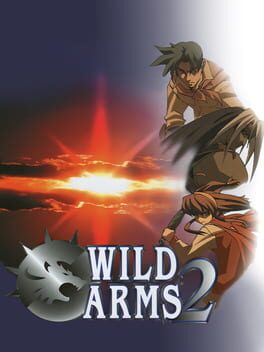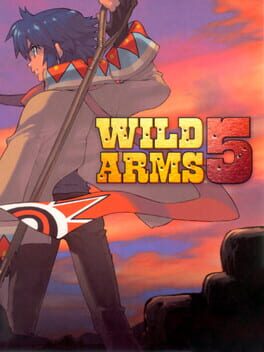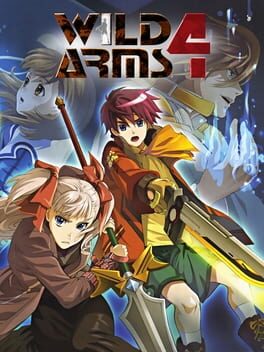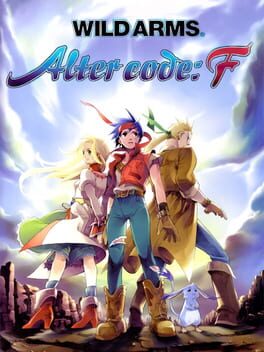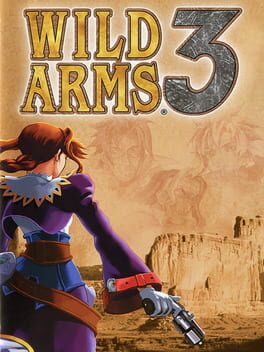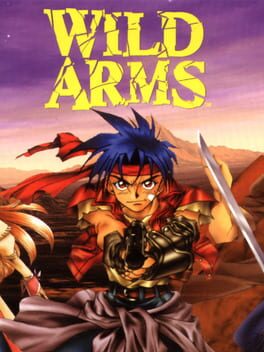

Wild Arms 2 is not a direct sequel to the first Wild Arms, although it is set in the same fictional world Filgaia, which combines elements of Old West, steampunk, and fantasy. The turn-based combat system against randomly appearing enemies resembles that of the predecessor, featuring techniques unique to each character, as well as the Guardian system, which allows the characters to summon powerful creatures to assist them in battles. Three combatants can be used actively in battles; the player can also switch any of them with a reserve character, up to six altogether.
Also in series
Released on
Genres
Reviews View More
In my pursuit to play more of this series as well as more PS1 RPGs, after I finished Wild Arms 1, I hopped straight into Wild Arms 2 (or as it’s called here in Japan, “Wild Arms 2nd Ignition”). Wild Arms 1 had a lot of potential, and given that it came out three years later, I figured the sequel had a lot of opportunity to fulfill that potential. RPGs as a genre evolved quite a bit between 1996 and 1999, after all. I was partially right and partially wrong, it turns out ^^;. It took me about 44 hours to complete the Japanese version of the game on real hardware.
The narrative of Wild Arms 2 is kinda a narrative sequel to the first game, but mostly not. I guess it’d be more accurate that it takes place in the far flung future of what was perhaps an alternate version of the events of the first game. In this distant future Falgaia, our story begins by following the stories of Lulika the crest sorcerer, Brad the convict, and Ashley (who is a boy) the soldier. With the opening being Brad sent to maximum security prison, Lulika helping out a struggling frontier town, and Ashley both becoming a war hero and then getting transformed into a horrible monster, things promise to be quite interesting as the three of them are recruited by a mysterious Count Irving into a special military unit: ARMS (Awkward Rush & Mission Savers (yes, really)) to take on the evil terrorist group Odessa.
Just from that brief little synopsis of the first seven or so hours, you probably already have a pretty good impression that Wild Arms 2 is a narrative that is trying to do a LOT, and you’re right. This isn’t even the tip of the iceberg (there are even two more main characters and an optional extra one who I didn’t even mention in that summary. Wild Arms 2 is a story about heroes: Who is viewed as a hero? Who gets to be a hero? How does a hero relate to their government or their society? How does a world in peace time handle the heroes who brought them that peace? It promises some pretty interesting setups at the start, but it proves woefully inadequate to fulfilling the task of delivering on those promises.
On a very base level, Wild Arms 2 has still not solved the problem it’s predecessor had in terms of the narrative being far too blunt (to the point of feeling patronizing) in how characters express who they are and what they believe. We still very much have a lot of “I am [NAME] and this is what I believe and this is why I believe it” dialogue, and that is barely an exaggeration. However, given that Wild Arms 1 was more of a character-driven piece without much focus on larger philosophical or political themes, this was a bit more easily ignored, and its narrative more or less worked (at least for a game from 1996). Wild Arms 2 on the other hand, which actually does try to have a very politically and philosophically focused narrative, is hit much harder by this inability to be subtle. It leaks into virtually every aspect of the writing as well, with characters talking like philosophy majors almost constantly to the point that they do a very poor job of actually feeling like real people. It’s difficult to empathize with or try to read much nuance into characters when they all feel like living philosophy textbooks. I’d estimate at least half if not more of the dialogue spoken by our main characters has this feeling, and while it starts off somewhat charming, it gets grating and boring far before the end of our narrative.
This problem is compacted even further by just how poorly Wild Arms 2 is at even exploring these themes. Characters like Brad feel woefully underdeveloped via their actions despite the amount of text that tries to convince us otherwise, and characters like our last main party member feel incredibly rushed and poorly portrayed with how weirdly late they join the party compared to everyone else. The game is far too attached to its few big important set pieces, so it takes almost until the end of disc 1 for any catharsis towards fighting our antagonists to take place either, and these antagonists also have the misfortune of feeling both far too verbose and paradoxically far too underdeveloped to really have much to contribute thematically. While all of that very terminology-heavy dialogue can be quite difficult to sift through at times, one nice thing about the game being so straightforward with its ideology is that it’s actually very clear that they simply have no idea what they’re talking about.
This is a story that ultimately has no idea what heroes are or how they relate to society. I’ll admit that it has some very interesting points to make about how heroes are just as much contributors to society as they are scapegoats to society’s problems, but there just isn’t a unifying ideology behind all of those ideas. At the end of the story, we’re left with a world almost identical to the one we started with, and the only things really different are that a few people are dead and the world ending threats have been dealt with. For a game with so much to critique about heroes and society, it is actually one hell of a pro-status quo piece of fiction. It has societal critiques, yes, but in just how aggressively it fails to imagine a world not entirely defined by what it is critiquing, we’re left with a piece of fiction that feels extremely performative in the ideas it’s presenting despite the earnestness with which those ideas are often delivered. Whether this is down to the author’s bad politics (which I would say is at least partially true) or simply his inability as a writer is impossible to say for sure, but what I can pretty easily say for certain is that what he wrote for Wild Arms 2 makes for an experience that is as bloated textually as it is underwhelming thematically.
Mechanically, Wild Arms 2 is also quite a mixed bag compared to its predecessor. On a very base level, we still have a very straightforward turn-based RPG. However, there have been quite a lot of interesting new mechanics thrown into the mix to try and make something a bit more engaging. There are a few quality of life changes carried over and/or enhanced from the first game. For example, you can still equip items mid-battle and have it not consume a turn. Given that your party is now more than three members, however, they’ve extended this into also being able to swap characters between the fighting and reserve members all without consuming turns as well, which is also nice. We’ve also kept our tool-based dungeon exploration, and while it’s still hardly Legend of Zelda, this Lufia 2-style item use in dungeons does help mix things up a bit (even if this game still has some puzzles that are ungodly difficult and/or have no qualms about wasting a LOT of your time, very much like the first game did).
They’ve also tossed a few interesting gimmicks into world and dungeon exploration as well. As far as world exploration goes, instead of using the whole narrative contrivance of like, “Oh there are a pile of sheep here who don’t want to move, so you just can’t go in this dungeon yet”, we have the dowsing system. On the world map, you can press square to let out a ping, and if there’s a dungeon (or hidden item) nearby within the radius, it’ll appear. The interesting part is that you’ll only uncover a dungeon if you know about it (or it’s narratively time for you to be able to access it), so no going anywhere early. It’s a bit absurd at times how you apparently just can’t see the massive tower that’s allegedly in front of you yet, but it’s a clever design feature regardless. They’ve also given you the ability to avoid most random battles. Before an encounter, a little exclamation mark bubble will appear above your head. If it’s white, pressing X (or doing any action like using a tool or opening your inventory) will avoid the encounter. You still can’t avoid the red exclamation mark bubble encounters, but they stop appearing if you’re a high enough level compared to the enemies around you. It’s another very smart step in making the game just that much nicer to play.
The biggest new change, however, is that MP is completely gone. In its place, the FP (Force Point) system from the first game is now doing double duty. Force Points are gained by dealing damage through normal attacks or taking damage yourself. Like in the first game, you will unlock through the course of the story new Force Abilities of rank 1 to 4 that consume FP in multiples of 25 (level 1 consumes 25, level 2 consumes 50, and so on). However, now all of your spells and special abilities are also now linked to FP, but very importantly they do not actually consume FP. For example, your basic heal spell has a 5 FP requirement. As long as you have at least 5 FP, you can cast heal as many times as you want and it never consumes FP. Only your big Force Abilities actually consume FP. Removing MP is a very noble endeavor, as it means you get to let loose a lot more in battle, but it has a lot of unfortunate side effects too.
First of all we have quite the double edged sword of being able to go as all out as you want in every battle. Because few resources are truly scarce, this means we run into the problem that encounters are eminently solvable. Once you’re powerful enough to just be able to wipe out your enemies before they can get a turn, there’s no reason not to just do that every time, and as the game isn’t terribly hard most of the time, this means random encounters start to feel very time wasty very fast. Additionally, not every character is benefited equally by this bonus. Particularly Ashley and Brad who have their special guns which require ammo, they get no such benefit, and their freedom from MP matters very little when they’re still very much limited by how much ammo you have.
While we’re on the topic, the guns (also confusingly still called ARM weapons just like they were in the first game, but no relation to the ARMS group you’re now a part of) really feel like a mechanical afterthought. Whereas in the first game every gun had a limit of upgrades, it was more along the lines of “every gun can have its power, accuracy, and ammo pool upgraded X-many times”, and it made for a nice money sink in the end game, now all guns can only be upgraded ten times across all upgrades. This means that Ashley in particular, who lacks a Force Ability like Rodi did in the last game or Brad has in this game to make the gun they fire next have a 100% chance to hit, has his guns double worthless. Not only will they always be some combo of either too weak or too inaccurate due to this baffling new constraint on their power, but given the super form Ashley unlocks quite quickly that he needs a full Force Power bar to activate, it makes his non-FP generating guns all the more worthless. Brad’s guns already feel like a poorly balanced afterthought compared to other character’s special abilities, but Ashley’s really feel beyond pointless and very poorly considered as a mechanic.
Speaking of balance, now seems like about a good a time as any to talk about balance. Wild Arms 1 had a decent overall balance. While some bosses were awful difficulty spikes that you had to just get lucky to beat, it had an overall decent difficulty balance if you used your buffs intelligently and kept on top of your healing. It was still overall a bit too easy, as the same strategies worked too often on most things, but it at least required some thought. Here, as Wild Arms 2 seems to love doing with all things, we have that same problem from the first game but amplified even worse.
First of all, we have to mention the personal skill system. Every level up you get, you get a personal skill point, and these can be spent at personal skill point stores to give yourself passives. There are all range of passives, but some demand getting as soon as possible while others are basically worthless, and which are the former and which are the latter aren’t always obvious. Sure, it’s obvious that you should get the skill to increase the amount of HP you receive on level up as soon as you can, but it’s a lot less obvious that you’ll need the passives to decrease incoming physical damage and then the ones to do the same for incoming spell damage as soon as possible too. If you don’t have those passives (and even if you do, quite frankly), there are a lot of bosses that are absurdly hard and it feels like you can really do nothing but get lucky enough to damage race them successfully.
This is then further amplified as a problem in that, while you can buy basic healing items at the start of the game, after the third or fourth dungeon, they completely disappear from shops. You can actually never buy HP healing items of any strength after that point, and you’ll need to get any you might want by grinding them off of enemies. And remember, MP also doesn’t exist, so there’s no healing yourself with spells in between battles either. Combined with how this game still lacks FF-style tents to full heal outside of inns (and also STILL somehow lacks the ability to save on the world map), this is a really mean spirited obstacle that feels like a very unfair disadvantage to the player. Having to ration your healing items like it’s some sort of survival horror game (when the rest of the game really isn’t set up in a way to encourage that) just flat out sucks, full stop. Being that you have no worthwhile consumables to buy nor do you have really meaningful gun upgrades to buy either, it means money overall is damn near worthless the entire game. Being unable to buy more healing items doesn’t make the game particularly harder and it certainly doesn’t make it any more fun. It just makes it more frustrating, and it’s easily the biggest impact on the game’s already very needlessly mean difficulty curve.
Aesthetically, this is a pretty well done game. It’s got some noticeable loading times. They’re not particularly bad, but you will almost certainly notice how long it takes to get to the world map compared to some other games, and it can be a little grating here and there. Still, character sprites in locations look very nice and have a ton of character to all of their little animations, and 3D models and monster designs are very cool and well done too. The music is also, once again, absolutely excellent, and not slacking on the music is thankfully one thing this game absolutely has in common with its predecessor.
Verdict: Hesitantly Recommended. The fact that I’m well aware that the English translation of this game is infamously awful does affect this recommendation level somewhat, but only slightly. Even if the English translation were stellar, I couldn’t recommend this game any higher if I tried. It’s a thoroughly middle of the road RPG in an era where there was no shortage of absolutely stellar RPGs either already out or about to come out, and there’s really just not a ton of reason to play it. It’s not an awful game by any means, but with all of the other PS1 and PS2 RPGs out there you could burn 40 hours on, your time is simply better spent elsewhere.
The narrative of Wild Arms 2 is kinda a narrative sequel to the first game, but mostly not. I guess it’d be more accurate that it takes place in the far flung future of what was perhaps an alternate version of the events of the first game. In this distant future Falgaia, our story begins by following the stories of Lulika the crest sorcerer, Brad the convict, and Ashley (who is a boy) the soldier. With the opening being Brad sent to maximum security prison, Lulika helping out a struggling frontier town, and Ashley both becoming a war hero and then getting transformed into a horrible monster, things promise to be quite interesting as the three of them are recruited by a mysterious Count Irving into a special military unit: ARMS (Awkward Rush & Mission Savers (yes, really)) to take on the evil terrorist group Odessa.
Just from that brief little synopsis of the first seven or so hours, you probably already have a pretty good impression that Wild Arms 2 is a narrative that is trying to do a LOT, and you’re right. This isn’t even the tip of the iceberg (there are even two more main characters and an optional extra one who I didn’t even mention in that summary. Wild Arms 2 is a story about heroes: Who is viewed as a hero? Who gets to be a hero? How does a hero relate to their government or their society? How does a world in peace time handle the heroes who brought them that peace? It promises some pretty interesting setups at the start, but it proves woefully inadequate to fulfilling the task of delivering on those promises.
On a very base level, Wild Arms 2 has still not solved the problem it’s predecessor had in terms of the narrative being far too blunt (to the point of feeling patronizing) in how characters express who they are and what they believe. We still very much have a lot of “I am [NAME] and this is what I believe and this is why I believe it” dialogue, and that is barely an exaggeration. However, given that Wild Arms 1 was more of a character-driven piece without much focus on larger philosophical or political themes, this was a bit more easily ignored, and its narrative more or less worked (at least for a game from 1996). Wild Arms 2 on the other hand, which actually does try to have a very politically and philosophically focused narrative, is hit much harder by this inability to be subtle. It leaks into virtually every aspect of the writing as well, with characters talking like philosophy majors almost constantly to the point that they do a very poor job of actually feeling like real people. It’s difficult to empathize with or try to read much nuance into characters when they all feel like living philosophy textbooks. I’d estimate at least half if not more of the dialogue spoken by our main characters has this feeling, and while it starts off somewhat charming, it gets grating and boring far before the end of our narrative.
This problem is compacted even further by just how poorly Wild Arms 2 is at even exploring these themes. Characters like Brad feel woefully underdeveloped via their actions despite the amount of text that tries to convince us otherwise, and characters like our last main party member feel incredibly rushed and poorly portrayed with how weirdly late they join the party compared to everyone else. The game is far too attached to its few big important set pieces, so it takes almost until the end of disc 1 for any catharsis towards fighting our antagonists to take place either, and these antagonists also have the misfortune of feeling both far too verbose and paradoxically far too underdeveloped to really have much to contribute thematically. While all of that very terminology-heavy dialogue can be quite difficult to sift through at times, one nice thing about the game being so straightforward with its ideology is that it’s actually very clear that they simply have no idea what they’re talking about.
This is a story that ultimately has no idea what heroes are or how they relate to society. I’ll admit that it has some very interesting points to make about how heroes are just as much contributors to society as they are scapegoats to society’s problems, but there just isn’t a unifying ideology behind all of those ideas. At the end of the story, we’re left with a world almost identical to the one we started with, and the only things really different are that a few people are dead and the world ending threats have been dealt with. For a game with so much to critique about heroes and society, it is actually one hell of a pro-status quo piece of fiction. It has societal critiques, yes, but in just how aggressively it fails to imagine a world not entirely defined by what it is critiquing, we’re left with a piece of fiction that feels extremely performative in the ideas it’s presenting despite the earnestness with which those ideas are often delivered. Whether this is down to the author’s bad politics (which I would say is at least partially true) or simply his inability as a writer is impossible to say for sure, but what I can pretty easily say for certain is that what he wrote for Wild Arms 2 makes for an experience that is as bloated textually as it is underwhelming thematically.
Mechanically, Wild Arms 2 is also quite a mixed bag compared to its predecessor. On a very base level, we still have a very straightforward turn-based RPG. However, there have been quite a lot of interesting new mechanics thrown into the mix to try and make something a bit more engaging. There are a few quality of life changes carried over and/or enhanced from the first game. For example, you can still equip items mid-battle and have it not consume a turn. Given that your party is now more than three members, however, they’ve extended this into also being able to swap characters between the fighting and reserve members all without consuming turns as well, which is also nice. We’ve also kept our tool-based dungeon exploration, and while it’s still hardly Legend of Zelda, this Lufia 2-style item use in dungeons does help mix things up a bit (even if this game still has some puzzles that are ungodly difficult and/or have no qualms about wasting a LOT of your time, very much like the first game did).
They’ve also tossed a few interesting gimmicks into world and dungeon exploration as well. As far as world exploration goes, instead of using the whole narrative contrivance of like, “Oh there are a pile of sheep here who don’t want to move, so you just can’t go in this dungeon yet”, we have the dowsing system. On the world map, you can press square to let out a ping, and if there’s a dungeon (or hidden item) nearby within the radius, it’ll appear. The interesting part is that you’ll only uncover a dungeon if you know about it (or it’s narratively time for you to be able to access it), so no going anywhere early. It’s a bit absurd at times how you apparently just can’t see the massive tower that’s allegedly in front of you yet, but it’s a clever design feature regardless. They’ve also given you the ability to avoid most random battles. Before an encounter, a little exclamation mark bubble will appear above your head. If it’s white, pressing X (or doing any action like using a tool or opening your inventory) will avoid the encounter. You still can’t avoid the red exclamation mark bubble encounters, but they stop appearing if you’re a high enough level compared to the enemies around you. It’s another very smart step in making the game just that much nicer to play.
The biggest new change, however, is that MP is completely gone. In its place, the FP (Force Point) system from the first game is now doing double duty. Force Points are gained by dealing damage through normal attacks or taking damage yourself. Like in the first game, you will unlock through the course of the story new Force Abilities of rank 1 to 4 that consume FP in multiples of 25 (level 1 consumes 25, level 2 consumes 50, and so on). However, now all of your spells and special abilities are also now linked to FP, but very importantly they do not actually consume FP. For example, your basic heal spell has a 5 FP requirement. As long as you have at least 5 FP, you can cast heal as many times as you want and it never consumes FP. Only your big Force Abilities actually consume FP. Removing MP is a very noble endeavor, as it means you get to let loose a lot more in battle, but it has a lot of unfortunate side effects too.
First of all we have quite the double edged sword of being able to go as all out as you want in every battle. Because few resources are truly scarce, this means we run into the problem that encounters are eminently solvable. Once you’re powerful enough to just be able to wipe out your enemies before they can get a turn, there’s no reason not to just do that every time, and as the game isn’t terribly hard most of the time, this means random encounters start to feel very time wasty very fast. Additionally, not every character is benefited equally by this bonus. Particularly Ashley and Brad who have their special guns which require ammo, they get no such benefit, and their freedom from MP matters very little when they’re still very much limited by how much ammo you have.
While we’re on the topic, the guns (also confusingly still called ARM weapons just like they were in the first game, but no relation to the ARMS group you’re now a part of) really feel like a mechanical afterthought. Whereas in the first game every gun had a limit of upgrades, it was more along the lines of “every gun can have its power, accuracy, and ammo pool upgraded X-many times”, and it made for a nice money sink in the end game, now all guns can only be upgraded ten times across all upgrades. This means that Ashley in particular, who lacks a Force Ability like Rodi did in the last game or Brad has in this game to make the gun they fire next have a 100% chance to hit, has his guns double worthless. Not only will they always be some combo of either too weak or too inaccurate due to this baffling new constraint on their power, but given the super form Ashley unlocks quite quickly that he needs a full Force Power bar to activate, it makes his non-FP generating guns all the more worthless. Brad’s guns already feel like a poorly balanced afterthought compared to other character’s special abilities, but Ashley’s really feel beyond pointless and very poorly considered as a mechanic.
Speaking of balance, now seems like about a good a time as any to talk about balance. Wild Arms 1 had a decent overall balance. While some bosses were awful difficulty spikes that you had to just get lucky to beat, it had an overall decent difficulty balance if you used your buffs intelligently and kept on top of your healing. It was still overall a bit too easy, as the same strategies worked too often on most things, but it at least required some thought. Here, as Wild Arms 2 seems to love doing with all things, we have that same problem from the first game but amplified even worse.
First of all, we have to mention the personal skill system. Every level up you get, you get a personal skill point, and these can be spent at personal skill point stores to give yourself passives. There are all range of passives, but some demand getting as soon as possible while others are basically worthless, and which are the former and which are the latter aren’t always obvious. Sure, it’s obvious that you should get the skill to increase the amount of HP you receive on level up as soon as you can, but it’s a lot less obvious that you’ll need the passives to decrease incoming physical damage and then the ones to do the same for incoming spell damage as soon as possible too. If you don’t have those passives (and even if you do, quite frankly), there are a lot of bosses that are absurdly hard and it feels like you can really do nothing but get lucky enough to damage race them successfully.
This is then further amplified as a problem in that, while you can buy basic healing items at the start of the game, after the third or fourth dungeon, they completely disappear from shops. You can actually never buy HP healing items of any strength after that point, and you’ll need to get any you might want by grinding them off of enemies. And remember, MP also doesn’t exist, so there’s no healing yourself with spells in between battles either. Combined with how this game still lacks FF-style tents to full heal outside of inns (and also STILL somehow lacks the ability to save on the world map), this is a really mean spirited obstacle that feels like a very unfair disadvantage to the player. Having to ration your healing items like it’s some sort of survival horror game (when the rest of the game really isn’t set up in a way to encourage that) just flat out sucks, full stop. Being that you have no worthwhile consumables to buy nor do you have really meaningful gun upgrades to buy either, it means money overall is damn near worthless the entire game. Being unable to buy more healing items doesn’t make the game particularly harder and it certainly doesn’t make it any more fun. It just makes it more frustrating, and it’s easily the biggest impact on the game’s already very needlessly mean difficulty curve.
Aesthetically, this is a pretty well done game. It’s got some noticeable loading times. They’re not particularly bad, but you will almost certainly notice how long it takes to get to the world map compared to some other games, and it can be a little grating here and there. Still, character sprites in locations look very nice and have a ton of character to all of their little animations, and 3D models and monster designs are very cool and well done too. The music is also, once again, absolutely excellent, and not slacking on the music is thankfully one thing this game absolutely has in common with its predecessor.
Verdict: Hesitantly Recommended. The fact that I’m well aware that the English translation of this game is infamously awful does affect this recommendation level somewhat, but only slightly. Even if the English translation were stellar, I couldn’t recommend this game any higher if I tried. It’s a thoroughly middle of the road RPG in an era where there was no shortage of absolutely stellar RPGs either already out or about to come out, and there’s really just not a ton of reason to play it. It’s not an awful game by any means, but with all of the other PS1 and PS2 RPGs out there you could burn 40 hours on, your time is simply better spent elsewhere.
wild arms 1 is love at first sight
wild arms 2 is that guy your friends introduce you to because they think youll get along great and you do at first but then the more time you spend with each other, the less you like each other and you cant fully bring yourselves to dislike or hate each other because that would hurt your whole friend group so you tolerate each other and act like friends but deep down the both of you resent each other, your smiles are all fake and you wish you never met him but you cant seem to get rid of him either and its eating you up inside
wild arms 2 is that guy your friends introduce you to because they think youll get along great and you do at first but then the more time you spend with each other, the less you like each other and you cant fully bring yourselves to dislike or hate each other because that would hurt your whole friend group so you tolerate each other and act like friends but deep down the both of you resent each other, your smiles are all fake and you wish you never met him but you cant seem to get rid of him either and its eating you up inside
